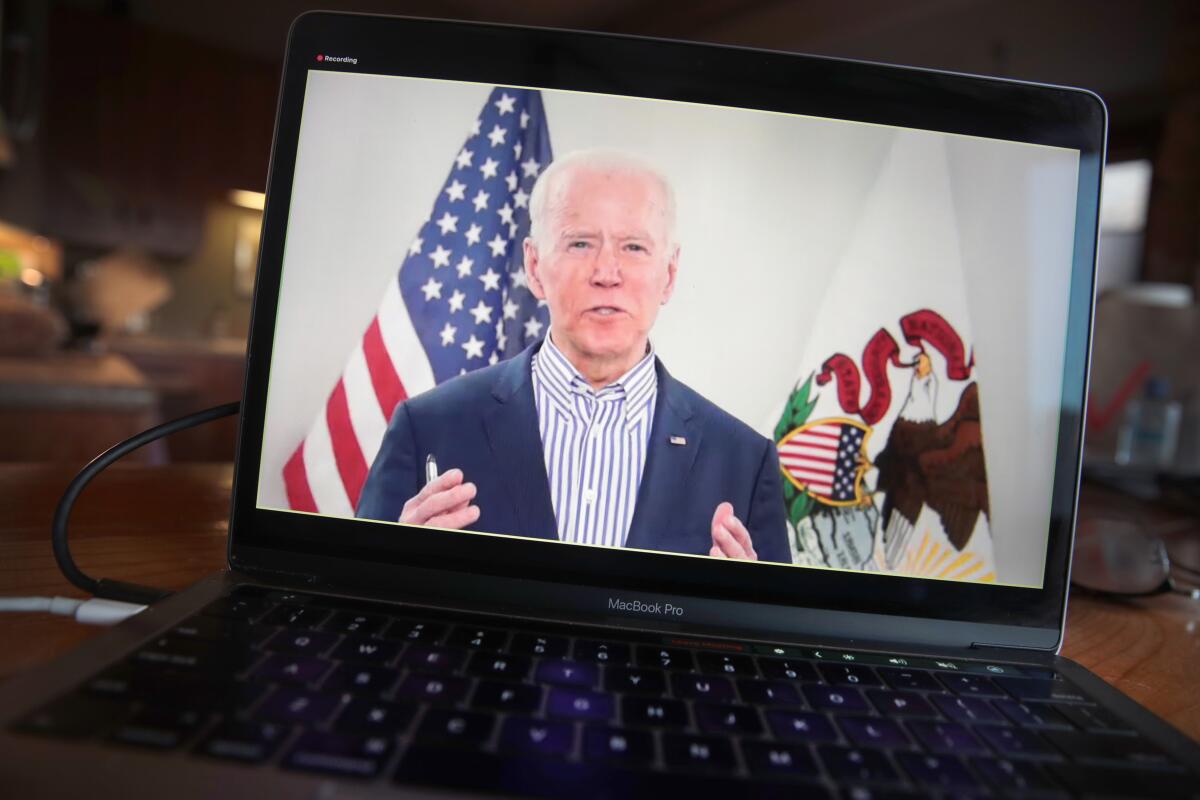Democrats wrote the playbook on digital organizing, so why is Trump dominating?

- Share via
WASHINGTON — Political campaign apps are hardly a new phenomenon, but when President Trump recently unveiled the one for his reelection bid, digital innovators on the left responded with alarm — and exasperation.
A refrain echoed from executive suites in Silicon Valley to the digital campaigning startups in Washington: Why hasn’t Joe Biden built anything this good?
The Trump app hijacks many of the online innovations that progressives have been pioneering since the president took office. It smoothly converts casual users into effective evangelists for the Trump brand, nudging them to draw in their family and social networks, and motivating them with challenges and prizes that make spreading the gospel of Trump as addicting and exhilarating as playing the slots.
Democrats who dismiss the app as just a gathering place for hardcore Trump loyalists are taking a risk. Alongside its relentless right-wing news feeds, cameos from Trump’s inner circle and amplification of conspiracy theories, the app effectively mobilizes and trains people to draw their politically uncommitted friends and neighbors into Trump’s orbit.
“I am not worried about the true believers downloading the app in May,” said Stefan Smith, who was the online engagement director for Pete Buttigieg’s presidential campaign. “I’m worried about the people in August who, between now and then, have been seeing post after post after post from their friends who downloaded it. And then they download it.”
Republicans have noticed the Biden disadvantage, too. “There are plenty of Democrats who know how to fix this,” said veteran Republican digital strategist Eric Wilson, who recently launched the nonprofit Center for Campaign Innovation. “Biden is now hearing from them on the op-ed page of the New York Times. For whatever reason the Biden campaign is not listening. They have decided to run the campaign like it is the 1970s.”
As Trump’s app started showing up on iPhones a few weeks ago, some Democratic operatives stopped vowing that Biden would close the digital gap with the president and pivoted to downplaying how much it matters.
Yet others have become alarmed by the digital gap‘s persistence amid the former vice president’s awkward adaptation to virtual campaigning, and his delay in embracing many of the innovative online tools and techniques that enabled Democrats to triumph in the 2018 midterm elections. Biden’s behind-the-curve campaigning nearly doomed his candidacy in the Democrats’ nominating contests earlier this year.
“It is scary to think how all that momentum we built is just dissipating,” said Emily Isaac, national relational organizing director for the Bernie Sanders campaign. “Trump is implementing these tactics, and it is painful to watch.… It feels like a missed opportunity. There is a lot of momentum right now and there is no reason Biden should not have an organizing program that dwarfs Trump’s.”
Isaac said she is confused by how slow the Biden campaign has been to show interest in the online organizing playbook that Sanders so effectively used to engage millions, including many new voters.
Operatives from the Buttigieg and Andrew Yang campaigns also say they are surprised to see their innovations going uncopied, leaving untapped large networks of online activists who could be churning out unique content for Biden and enlisting their friends and families in the effort.
“I’m sure we can do better on the internet; I am positive of that,” Biden said on SnapChat’s “Good Luck America” Tuesday. He cited as evidence his recent Instagram Q&A with “one of the leading soccer players in the world” (Olympic gold medalist Megan Rapinoe) and an episode of his campaign’s podcast with former rival Yang (Biden called him “Andrew Young”), whose unorthodox Democratic candidacy was powered by his online following.
“The fact is,” Biden said, “we are trying.”
His campaign is now doubling the size of its online team and feverishly recruiting talent. Campaign officials insist they are positioned to catch Trump online in due time, and they point to a frenzy of experimentation underway, massive growth in their email list, and the creation of nearly 2,000 Facebook groups.
The pandemic, with its restrictions on large gatherings, “is forcing us to scale so quickly,” said Rob Flaherty, digital director for the Biden campaign. “But those things making us move so fast are also the dynamics that make it so we can catch up and scale up an operation that can face off in a general election quickly and successfully.”
He said the campaign is soliciting ideas far and wide, and embracing advice from Biden’s former rivals.
“We are reaching out to everybody to find out what works,” said Flaherty, who himself was digital director for the presidential campaign of Beto O’Rourke, the former Texas congressman.
He noted that Buttigieg personally reviewed the Biden campaign’s “Rules of the Road” that help guide online efforts, and the campaign has sought extensive consultations with the digital leaders of other Democratic presidential campaigns, including the Sanders team.
The movement comes as anxieties about Biden’s digital gap with Trump have reached a fever pitch. Over the last week, prominent Democrats and some campaign operatives have begun very publicly offering the former vice president unsolicited advice on how to energize his online presence.
There is evidence Biden is trying to modernize. One new strategy empowers a network of dozens of volunteers who are adept in social media to build content for issues and themes the campaign is emphasizing on a given day. The effort is overseen not by a Biden operative but by a science teacher in Pennsylvania and a student at Duke University. One recent video generated two million views.
The campaign is also casting a wide net in its recruiting efforts, looking for talent both inside and outside the usual political circles. It recently hired the former executive producer of Buzzfeed Video. Architects of the trendsetting online strategies of two candidates who challenged Biden, Sen. Elizabeth Warren of Massachusetts and O’Rourke, now have digital leadership positions.
“It’s clear Biden’s digital ship is turning. The question now is whether or not it’s too late,” said Smith. “And we’re not going to have the answer to that for months.”
As Biden plays catch-up, Trump supporters have tried to make the digital gap a campaign issue. Campaign advisor and daughter-in-law Lara Trump seized on Biden’s struggle to transition to all-virtual campaigning in a call with reporters this week. “It’s very obvious the Trump campaign was prepared for a time like this and the Biden campaign was not,” she said.
The extent to which it all matters is a point of debate inside the Democratic Party. Some operatives with deep experience in organizing online for candidates say the digital tactics that were necessary to catapult a Sanders or Obama or Trump into the top tier don’t necessarily work for a candidate like Biden, who has been well-known in politics for so long.
Joe Trippi, who managed the digitally groundbreaking presidential campaign of former Vermont Gov. Howard Dean in 2004, said the tactics that propelled Dean were not nearly as useful to the eventual nominee, establishment stalwart John F. Kerry, then a Massachusetts senator.
“Does Biden need to improve online? Yeah, he does,” Trippi said. “Does it mean he won’t win if he doesn’t? I don’t believe that.”
Trippi points to how Biden crushed his more digitally savvy rivals in the primary. “If it were the case that improving online is a do-or-die situation,” he said, “there is no way he would be the nominee.”
Times staff writer Janet Hook contributed to this report.
More to Read
Get the L.A. Times Politics newsletter
Deeply reported insights into legislation, politics and policy from Sacramento, Washington and beyond. In your inbox three times per week.
You may occasionally receive promotional content from the Los Angeles Times.











